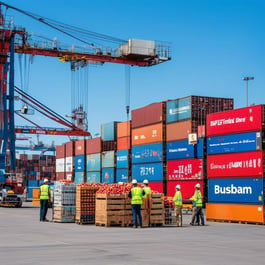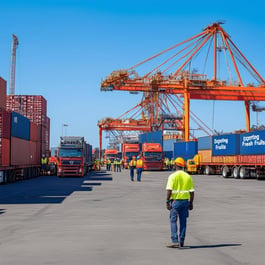Exporting Fruits: FCA Hong Kong, Shipping from Port of Tacoma
Summary
- Port of Loading: Port of Tacoma, WA
- Port of Discharge: Port of Hong Kong
- Commodity: Fruits
- Incoterms: FCA (Free Carrier)
- Payment Term: Letter of Credit
Key Insights:
- FCA Responsibilities: Sellers deliver fruits cleared for export to the designated carrier at the Port of Tacoma, while buyers manage freight, insurance, and post-discharge logistics.
- Logistics Planning: Proper packaging, temperature-controlled storage, and timely booking of refrigerated containers are essential to maintain fruit quality.
- Essential Documentation: Commercial invoices, bills of lading, certificates of origin, and phytosanitary certificates ensure smooth customs clearance.
- Customs Compliance: Exporters must meet U.S. export regulations and Hong Kong’s stringent import requirements for agricultural products.
- Risk Mitigation: Buyers should secure marine insurance and use tracking tools to monitor shipment progress and maintain fruit quality.
How to Streamline Your Export Operations Using FCA Incoterms
Exporting fruits from the Port of Tacoma to the Port of Hong Kong under FCA terms requires meticulous planning and collaboration to ensure quality and compliance. This guide provides actionable steps to streamline the process.
Step 1: Understand FCA Responsibilities
Under FCA:
- Seller Responsibilities:
- Deliver fruits to the designated carrier at the Port of Tacoma, cleared for export.
- Ensure proper packaging and labeling of fruits.
- Provide all required export documentation.
- Buyer Responsibilities:
- Arrange and pay for freight from Tacoma to Hong Kong.
- Manage marine insurance coverage during transit.
- Handle customs clearance and local transportation from the Port of Hong Kong to the final destination.
Pro Tip: FCA is ideal for sellers focusing on local export logistics while allowing buyers control over international transport and insurance.
Step 2: Plan Your Export Logistics
Proper logistics planning ensures fruits arrive fresh and intact:
- Select the Right Carrier:
- Choose a carrier experienced in transporting perishable goods with refrigerated container options.
- Secure Temperature-Controlled Containers:
- Arrange for reefers (refrigerated containers) to keep fruits at optimal temperatures.
- Prepare the Shipment:
- Ensure fruits are packed in ventilated crates or cartons and labeled per international standards.
- Book Freight Early:
- Reserve space well in advance, especially during peak export seasons.
Step 3: Prepare Essential Shipping Documents
Accurate documentation is critical for smooth customs clearance:
- Commercial Invoice: Details the value of fruits, transaction terms, and buyer/seller information.
- Bill of Lading: Serves as proof of shipment and outlines delivery terms.
- Packing List: Provides a detailed breakdown of the shipment contents.
- Certificate of Origin: Verifies the fruits’ U.S. origin.
- Phytosanitary Certificate: Certifies compliance with Hong Kong’s import standards for agricultural goods.
Pro Tip: Validate all documents for consistency to prevent delays during customs clearance.
Step 4: Navigate Customs Clearance
Customs clearance ensures compliance with U.S. and Hong Kong regulations:
- Submit all required documents to relevant customs authorities.
- Verify compliance with Hong Kong’s phytosanitary and labeling standards.
- Address any additional documentation or inspection requests promptly.
- Pay applicable duties and taxes upon arrival in Hong Kong.
Pro Tip: Collaborate with a customs broker familiar with exporting fruits to Hong Kong for a seamless process.
Step 5: Mitigate Risks and Optimize Costs
- Insurance Coverage: Buyers should arrange marine insurance to protect the shipment against potential damage or loss.
- Freight Negotiation: Buyers can secure competitive rates for refrigerated container transport.
- Shipment Tracking: Use tracking tools to monitor the shipment and address potential delays.
Key Takeaways for Exporters
- Focus on Export Readiness: Sellers are responsible for ensuring fruits are export-ready and delivered to the carrier at the Port of Tacoma.
- Documentation is Critical: Accurate and complete documentation ensures compliance with U.S. and Hong Kong import regulations.
- Collaboration is Key: Work with reliable carriers, customs brokers, and buyers to streamline the process and maintain fruit quality.
By following these steps, exporters can successfully deliver fruits from Tacoma to Hong Kong under FCA terms while ensuring compliance, efficiency, and quality.




Leave a Comment